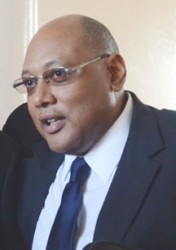Speaker of the National Assembly Raphael Trotman yesterday said that the ball is in the government’s court to end the parliamentary impasse following the prorogation of Parliament on November 10th by President Donald Ramotar and he issued a call for the administration to take the necessary steps, beyond writing a letter of invitation, if it is sincere about dialogue.
President Ramotar has written a letter to Opposition Leader David Granger inviting him to talks but the opposition—including the Alliance For Change—has stuck to its guns that it would not dialogue with the administration once Parliament remains prorogued.
In comments to the Stabroek News following questions Trotman stated that one meaningful step the administration could take is issuing a statement indicating that it is prepared to revisit its policies and positions that prompted the no-confidence motion in the first instance. He gave the example of the 2008/2009 parliamentary crisis in Canada and how it was eventually defused. The statement, Trotman said, should also state that the administration is prepared to have discussions on the issues that concern the opposition; whilst at the same time putting forward its own list of priorities. Further, it should state that though the past there years have ben turbulent and unproductive, the last part of the 10th Parliament can see genuine cooperation and progress and to this end the government is willing to invite an impartial and mutually acceptable facilitator to navigate the process.
The facilitator could be had through a local group of eminent citizens, Caricom, UNDP, OAS or the Common-wealth. The Speaker believes that if this is done then the opposition parties would be hard-pressed to say no.

“Should the Govern-ment not want to go the route set out above, then I believe that in January, 2015 it will seek to return to the Assembly with a budget that its sprinkled with goodies, and expect the opposition to reject it in totality in favour of the NCM (no-confidence mo-tion); thereby giving it reason to dissolve Parliament in time for elections in April,” Trotman predicted.
Meantime, asked whet-her he had received a response to his letter sent to Commonwealth Secre-tary General Kamalesh Sharma, the Speaker said he had received no formal response but had been unofficially advised that they are taking guidance from the British Foreign and Commonwealth Office on how to proceed. Also, he said he believes the comments from the leaders that they preferred a “local” resolution were communicated to the Secretary General and officers of the Secretariat and they are responding accordingly.
“The Guyana Parlia-ment, as a Member of the Commonwealth Parlia-mentary Association, urges you to use your good offices, together with the entire weight of the Association, to intervene so that we could have a return to democracy,” Trotman had said in his letter to Sharma.
“To this end, I invite you to send a delegation to Guyana to engage all sides of this disagreement so that this unhealthy situation may be brought to a speedy and peaceful end,” he had added.
And as regards to his comment about there being other meetings held in the National Assembly following the held hours after the President issued the proclamation of prorogation, Trotman said he had indicated to the parties that if they are interested they can have a series of “town hall” styled meetings to engage and discuss topical issues. Those meetings would not be formal/official sittings of the National Assembly.
Questioned, the Speaker said he has not met with the various party leaders on the way forward as at present the positions “look intractable, and if, and when, I sense an opening, I will most certainly meet with them all.
“I believe that every problem has a solution that always includes dialogue. In fact even after fighting there has to be talks so whether we fight or don’t fight, we have to come back to talking,” Trotman said.
He added that what is needed is a “new” national agenda which is the reason behind him advocating for a process to update the National Development Strategy and use it as the blue print for government. This is not only in terms of policy items, but also in terms of how government is structured, giving meaning to Article 13 of the Constitution.





